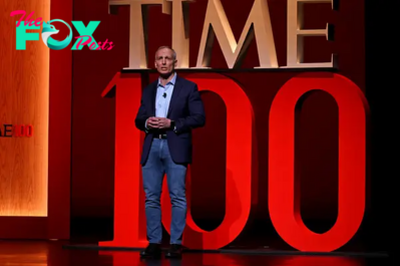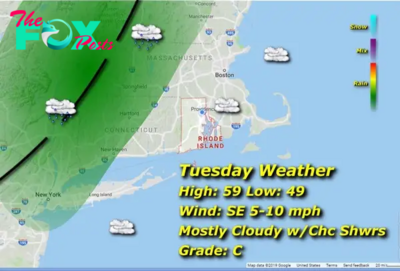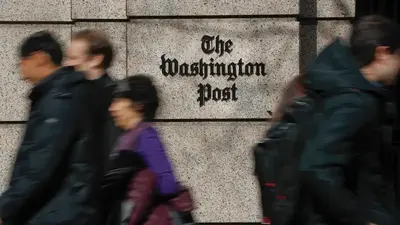Business
Stock market today: Wall Street turns lower after Fed hints at more rate hikes
NEW YORK -- Stocks turned lower on Wall Street after the Federal Reserve suggested that it may raise interest rates two more times this year, even though it kept rates steady on Wednesday. Treasury yields rose sharply. The S&P 500 was down 0.7% after being modestly higher before the Fed’s announcement. The index had been riding a winning streak to its best level since April 2022. The Nasdaq fell 0.6% and the Dow Jones Industrial Average lost 349 points, or 1%. The high rates the Fed is using to fight inflation do so by slowing down much of the economy.
THIS IS A BREAKING NEWS UPDATE. AP’s earlier story follows below.
Stocks are drifting higher Wednesday, as Wall Street waits to hear what the Federal Reserve’s latest economy-moving decision will be on interest rates.
The S&P 500 was 0.3% higher in afternoon trading after riding a winning streak to its best level since April 2022. The Dow Jones Industrial Average was down 100 points, or 0.3%, at 34,112, as of 12:54 p.m. Eastern time, while the Nasdaq composite was 0.4% higher.
Some stocks were making sharp moves, including drops for several health insurers after UnitedHealth Group flagged how many customers were getting knee procedures and other outpatient services done. That’s something that could raise costs for insurers, and UnitedHealth fell 7.1%. Humana dropped 12.2%.
Stocks of companies that make products used in hip replacements and other health procedures, meanwhile, were at the front of the market. Stryker rose 5.4%, and Edwards Lifesciences gained 5.2%.
But the majority of Wall Street was quiet, with the main event coming later in the afternoon. That’s when the Federal Reserve will announce its latest move on interest rates after jacking them to their highest levels since 2007 in hopes of getting high iNFLation under control.
The wide expectation on Wall Street is that the Fed will make no move, which would be the first time in more than a year where it hasn’t raised rates. INFLation has come down since its peak last summer, and a report Wednesday morning showed price gains at the wholesale level eased in May to the most modest iNFLation from year-earlier levels since 2020.
Hikes to interest rates take a notoriously long time to take effect, and they can do so in unanticipated and damaging ways. Already, they’ve helped lead to three high-profile failures in the U.S. banking system, a monthslong contraction in the manufacturing industry and worries about a possible recession.
But many on Wall Street don’t expect this to be the end to the Fed’s rate hikes. The widespread bet is that it will resume raising rates in July.
Even if it’s come down, inflation is still too high for comfort. It’s hurting all kinds of households, particularly those with lower incomes. It’s also giving ammunition to the members of the Fed considered “hawks,” or the ones more inclined to keep raising rates, while “doves” favor a longer pause.
That’s setting the stage for what Gargi Chaudhuri, head of iShares Investment Strategy Americas, calls a “hawkish skip” for the Fed this afternoon.
She said that while easing iNFLation data “reduces the risk that the Fed may have to keep hiking into the 6% range, the data is not enough to conclude that the Fed will ease anytime soon.”
The federal funds rate is currently in a range of 5% to 5.25%, up from virtually zero early last year.
That could also be setting the stage for at least one dissent in the vote by the Fed's policy making committee this afternoon. If that were to happen, it would be the first since last June, noted Brian Jacobsen, chief economist at Annex Wealth Management.
In the bond market, the yield on the 10-year Treasury fell to 3.79% from 3.82% late Tuesday. It helps set rates for mortgages and other important loans.
The two-year Treasury yield, which moves more on expectations for the Fed, fell to 4.62% from 4.67%.
In stock markets abroad, indexes were modestly higher in Europe and mixed across Asia. Japan's Nikkei 225 rose 1.5%, continuing a strong run where it's already jumped more than 28% this year.
___
AP Business Writers Matt Ott and Joe McDonald contributed.
-

 Business2h ago
Business2h agoWelsh sauce firm launches two new merchandise in partnership with Feast
-

 Business4h ago
Business4h agoB2Prime Acquires a Security Dealer License in Seychelles, Expanding Global Operations
-

 Business12h ago
Business12h agoA Call for Embracing AI—But With a ‘Human Touch’
-

 Business18h ago
Business18h agoWhat is New at the Old Groovy Blueberry Location in New Paltz?
-

 Business18h ago
Business18h agoBlaze Ignites Inside LaGrangeville, New York Car Wash
-

 Business1d ago
Business1d agoUS long-term care costs are sky-high, but Washington state’s new way to help pay for them could be nixed
-

 Business1d ago
Business1d agoRhode Island Weather for April 30, 2024 – John Donnelly, meteorologist
-

 Business1d ago
Business1d agoJoe Andruzzi Foundation launches UniCORN: Comprehensive New England cancer resources



























